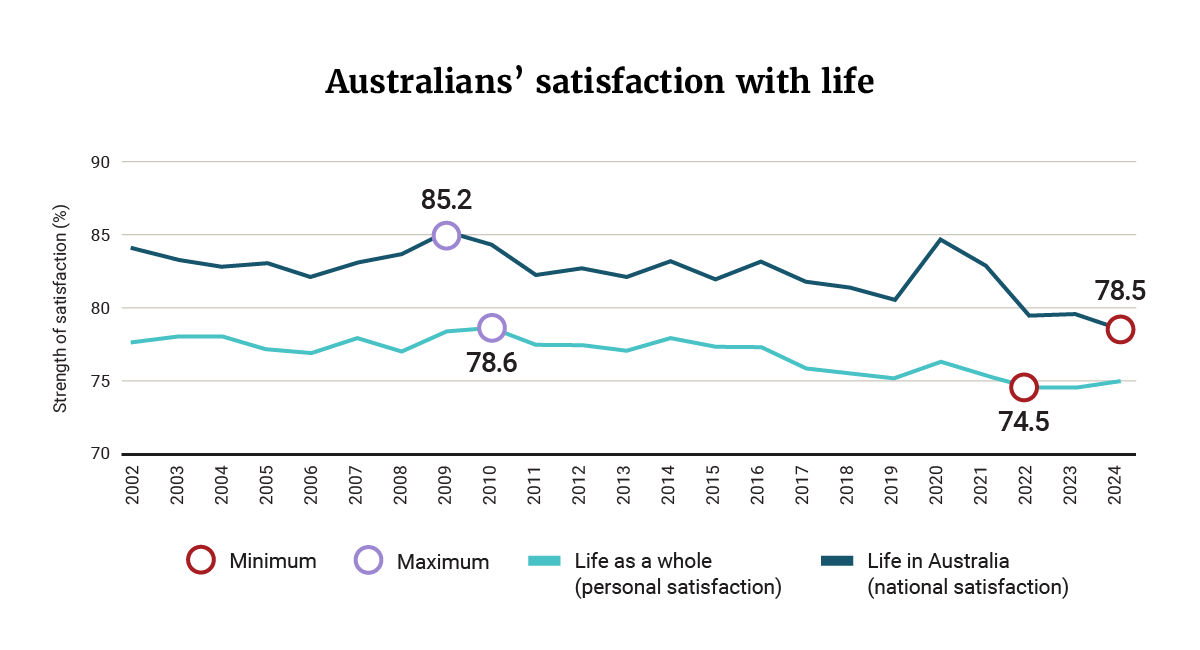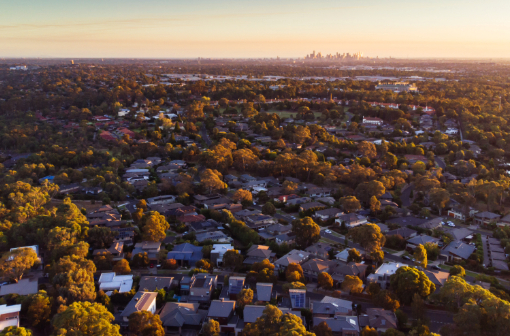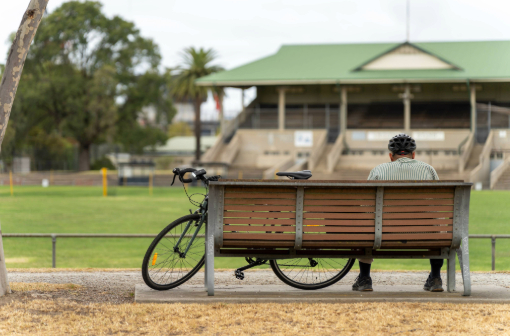“If we’re thinking about whether we’re heading in the right direction, the data would suggest that we’re not.”—Dr Kate Lycett, Australian Unity Wellbeing Index lead researcher, Deakin University
Key points
- This year’s Australian Unity Wellbeing Index shows that our satisfaction with life in Australia has hit an all-time low.
- Our satisfaction with health also slumped to an unprecedented low.
- Personal wellbeing scores and satisfaction with life “as a whole” both continue to remain very low.
How are we tracking as a nation? It’s a big question, and one that the Australian Unity Wellbeing Index sets out to answer every year. After 41 surveys, Wellbeing Index researchers have a wealth of data showing how our satisfaction with our personal lives and life in Australia shift over time. Unfortunately, this year’s results make it clear that things are not trending in a positive way.
“We’re not tracking well, and that’s important for us to know as a nation,” says lead researcher Dr Kate Lycett. “If we’re thinking about whether we’re heading in the right direction, the data would suggest that we’re not.”

New all-time lows
Stark evidence of this came when respondents were asked to gauge their overall satisfaction with life in Australia. The response was emphatic, with results plummeting to an all-time low. Satisfaction with the economic situation meanwhile also hit rock bottom. “That obviously fits with the cost-of-living crisis,” says Kate. “We also saw a significant drop in government satisfaction compared to last year.”
While the macro picture was chastening in Australia, things did not improve at the personal level. Personal wellbeing scores and satisfaction with life “as a whole” both continue to remain very low.
What’s intriguing is that both personal and national wellbeing were much higher in 2020—results that at first glance are puzzling, given that 2020 was the year that COVID-19 ravaged the country and lockdowns confined us to our homes. Yet what made the difference back then, suggests Kate, is that “we had a lot of government support and people rallied around each other”. Financial measures were brought in specifically to help people on low and middle incomes weather the crisis. “I think we can learn a lot from that time,” says Kate.
The impact of our cost-of-living crisis
Consistent with previous data, it’s clear that certain groups are particularly exposed by the rising cost of living. In 2024, the groups with the lowest personal wellbeing scores included people who are unemployed, rely on disability support, or have household incomes below $33,800. “We see these same groups with the lowest personal wellbeing year in, year out, yet we fail as a nation to lift them up. This just increases inequities, so the idea of social mobility is becoming harder than ever,” says Kate.
Yet middle Australia is increasingly doing it tough as well. According to ABS Census data from 2023, the median household income is $92,040. But the new survey reveals that this figure still isn’t enough to protect your personal wellbeing.
“What we’ve noticed in the last few years—particularly the last three years—is that people with an average income used to do pretty well, but that's not happening any longer,” says Kate. “Their wellbeing is significantly lower than those from high income households and that’s important because it suggests that there’s a large group of Australians who are really struggling.”

Growing challenges with health
Of the seven domains of the Personal Wellbeing Index, this year’s results showed declining satisfaction with our standard of living, personal safety and community connectedness. Most notably, our satisfaction with health slumped to an unprecedented low.
This fall in health satisfaction is also likely to have a financial basis, suggests Kate. This year’s results showed that large numbers of Australian adults went without at least one essential item—most commonly healthcare or food—due to money pressures in the past month. In fact, one in two adults under 55 years old were going without such essentials. “People are putting off paying for services like going to the doctor or buying medicine, so money plays a role,” says Kate.
“The other thing that’s happening is the healthcare system itself is struggling. There’s longer waiting lists and people often can’t get the care that they need. We also know that in the younger age groups, we have a mental health epidemic that we need to talk more about and act on.”
The value of support
Amid all the doom and gloom, is there any positive news from this year’s survey? Kate points to a finding that shows the importance of support from our loved ones.
For people who are “in the middle” when it comes to their financial satisfaction with their ability to afford the things they need, their ability to get support from friends and family significantly boosts their wellbeing. “As we go through life, we’ll have highs and lows. When people have strong relational support, these are the things that can buffer them,” she says.
“It’s one of the really lovely things we saw this year and just shows the power of relational support.”
Disclaimer: Information provided in this article is of a general nature. Australian Unity accepts no responsibility for the accuracy of any of the opinions, advice, representations or information contained in this publication. Readers should rely on their own advice and enquiries in making decisions affecting their own health, wellbeing or interest. Interviewee titles and employer are cited as at the time of interview and may have changed since publication.



